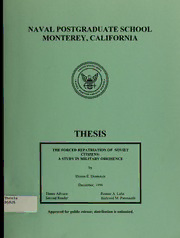
The forced repatriation of Soviet citizens: a study in military obedience PDF
Preview The forced repatriation of Soviet citizens: a study in military obedience
NAVAL POSTGRADUATE SCHOOL MONTEREY, CALIFORNIA THESIS THE FORCED REPATRIATION OF SOVIET CITIZENS: A STUDY IN MILITARY OBEDIENCE by Donna E. Dismukes December, 1996 Thesis Advisor: Roman A. Laba Thesis Second Reader: Bertrand M. Patenaude D5826 Approved for public release; distribution is unlimited. REPORT DOCUMENTATION PAGE Form Approved OMB No. 0704-0188 Public reportingburdenforthiscollectionofinformationisestimatedtoaverage 1 tiourperresponse, includingthetimeforreviewing instruction, searchingexistingdatasources, gathering andmaintainingthedataneeded, andcompletingand reviewingthecollectionofinformation Send commentsregardingthisburdenestimateoranyotheraspectofthiscollectionofinformation, includingsuggestionsforreducingthisburden,to Washington headquartersServices, DirectorateforInformation Operationsand Reports, 1215Jefferson DavisHighway, Suite 1204,Arlington, VA 22202-4302, andtotheOfficeofManagementand Budget, PaperworkReduction Project(0704-0188)Washington DC 20503 1. AGENCYUSEONLY (Leaveblank) 2. REPORTDATE 3. REPORTTYPEANDDATESCOVERED Decen±)er 1996 Master'sThesis 4. TITLEANDSUBTITLE 5. FUNDINGNUMBERS THEFORCED REPATRIATION OF SOVIET CITIZENS: A STUDY IN MILITARY OBEDIENCE 6. AUTHOR(S) Dismukes, DonnaE. PERFORMINGORGANIZATION NAME(S)ANDADDRESS(ES) 8. PERFORMING ORGANIZATION 7. REPORTNUMBER Naval Postgraduate School Monterey, CA 93943-5000 9. SPONSORING/MONITORINGAGENCYNAME(S)ANDADDRESS(ES) 10.SPONSORING/MONITORING AGENCYREPORTNUMBER SUPPLEMENTARYNOTES 11. Theviews expressed in thisthesis arethoseofthe authorand do not reflect the official policyorposition ofthe Department ofDefense orthe U.S. Govenunent. 12a. DISTRIBUTION/AVAILABILITYSTATEMENT 12b.DISTRIBUTIONCODE Approvedforpublic release; distributionunlimited. 13. ABSTRACT (maximum 200 words) On 11 February 1945, at the conclusion ofthe Yalta Conference, the United States signed a Repatriation Agreement with the USSR. The interpretation of this Agreement resulted in the forcible repatriation of all Soviets "regardless of their wishes." Repatriation operations became scenes ofcarnage as Soviets fiercely resisted the return to persecution, torture, and in many cases, execution. Militaryobjectionsto the policy failed to result in its cancellation. This thesis examines the military struggle to find a balance between obedience and moral obligation under extremely difficult conditions The forced repatriationoperations, which tookplacefrom 1945 - 1947, standas aprecursor to the new world ofpeace-keeping and peace-enforcement. These new military missions will undoubtedly bring military personnel face to face with operations ofa similarly troubling nature. This study ofpast events may prove usefiil for the development ofpolic> for futureoperations. 14. SUBJECTTERMS 15. NUMBEROF PAGES Military Obedience, ForcedRepatriation 153 16. PRICECODE 17. SECURITY 18. SECURITY 19. SECURITY 20. LIMITATIONOF CLASSIFICATIONOFREPORT CLASSIFICATIONOFTHIS PAGE CLASSIFICATIONOF ABSTRACT ABSTRACT Unclassified Unclassified UL Unclassified NSN7540-01-280-5500 Standard Form298 (Rev. 2-89) Prescribed byANSIStd. 239-18 Approved for public release; distribution is unlimited THE FORCED REPATRIATION OF SOVIET CITIZENS: A STUDY IN MILITARY OBEDIENCE Donna E. Dismukes Lieutenant Commander, United States Navy B.A., Assumption College, 1981 Submitted in partial fulfillment ofthe requirements for the degree of MASTER OF ARTS IN NATIONAL SECURITY AFFAIRS from the NAVAL POSTGRADUATE SCHOOL December 1996 AJ'i/O / Cl^ DUDLEY KNOX L!BR/i.RY NAVAL POSTGRADUATE SCHOOl MONTEREY CA ABSTRACT 93943-5101 On 11 February 1945, at the conclusion ofthe Yalta Conference, the United States signed a Repatriation Agreement with the USSR. The interpretation ofthis Agreement resulted in the forcible repatriation of all Soviets "regardless of their wishes." Repatriation operations became scenes ofcarnage as Soviets fiercely resisted the return to persecution, torture, and in many cases, execution. Military objections to the policy failed to result in its cancellation. This thesis examines the military struggle to find a balance between obedience and moral obligation under extremely difficult conditions. The forced repatriation operations, which took place from 1945 - 1947, stand as a precursor to the new world of peace-keeping and peace-enforcement. These new military missions will undoubtedly bring military personnel face to face with operations of a similarly troubling nature. This study of past events may prove useful for the development of policy for future operations. VI TABLE OF CONTENTS PART I - FORCED REPATRIATION AND ITS EFFECTS INTRODUCTION I. 1 MILITARY OBEDIENCE A. 1 II. THE BUILD-UP TO FORCED REPATRIATION 7 A. SOVIET SERVICE IN THE REICH 7 1. Forced Laborers 8 2. Prisoners ofWar 10 3. Soviet Defectors 14 B. REPATRIATION PRE-YALTA 15 LEGALITY OF FORCED REPATRIATION C. 17 D. BRITISH DECISION TO USE FORCE 18 E. US DECISION TO USE FORCE 23 III. NEGOTIATING THE AGREEMENT 27 A. OMEN OF THINGS TO COME 27 B. NEGOTIATIONS 28 C. THE REPATRIATION AGREEMENT 35 D THE MILITARY ROLE IN DECIDING ON FORCE 41 IV. THE POLICY ENACTED 45 A. FALSE IMPRESSIONS 45 B. MASS REPATRIATION 47 vii C. VLASOV'S ARMY 49 A Handful ofExceptions 53 1. D. THE COSSACKS 54 1. Moral Decisions 63 DISHONORABLE DUTY V. 65 A. SETTING THE EXAMPLE 65 B. JUSTIFICATION FOR REPATRIATION 66 C. THE EDUCATION OF THE TROOPS 68 D. THE MILITARY REACTS 71 E E^CIDENTATFORTDIX 75 VI. THE SOLDIERS PROTEST 79 A. FIELD-MARSHAL ALEXANDER RESISTS 79 B. THE SOLDIERS REBEL 83 C. INCIDENT AT FORT KEMPTEN 90 D. EISENHOWER CALLS AHALT 93 E. THE MCNARNEY-CLARK DIRECTIVE 95 F. FINAL OPERATIONS 98 l.Plattling 101 2. Operation Keelhaul 103 3. Operation Eastwind 106 vni
